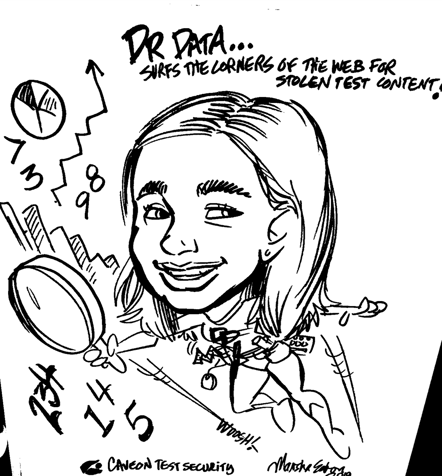CAVEON SECURITY INSIGHTS BLOG
The World's Only Test Security Blog
Pull up a chair among Caveon's experts in psychometrics, psychology, data science, test security, law, education, and oh-so-many other fields and join in the conversation about all things test security.
Games and Test Security: Why I Work in Testing
Posted by Sarah Toton, Ph.D.
updated over a week ago
Until a few years ago, I didn’t know that test security was a field. If you had told me that I’d be working as a Data Forensics Scientist, my response would have been “A what?” However, looking back on my own experiences, I can see why test security matters so much to me and
why I truly believe in what I do at Caveon.
The World Just Isn't Fair
When I was a youngster, my cousins and I were playing Monopoly. I was doing well and in second place. I was about to make my move to win the game, when an underhanded deal (which was definitely against the rules of the game) was struck between two of the other players. Despite my protests, all of the other players allowed the deal to be struck in a majority ruling. “ It’s not fair!” I yelled, while the other players hooted gleefully. Shortly after the ruling, however, the game devolved into chaos. Why should we continue playing a game that had already been tainted by unfairness? A game of Monopoly takes hours and hours, and we couldn’t go back in time to undo what had already been done. When I win, I want to know I earned it. When I lose, I want to know it is because someone else deserved it. Although it seems silly now, that Monopoly game was the first time I remember feeling that sometimes the world truly isn’t fair.
Connecting Games to Tests
Lucky for me, it was just a Monopoly game, and I recovered quickly. But when it comes to cheating on high-stakes tests, the harm is much greater. Cheating devalues testing programs, particularly the assessment instrument and the reputation of the program. After all, why should we have faith in a testing program when it has been tainted by unfairness?
Cheating is unfair for the examinees, and I think unfairness is a moral issue. If you try to do what is right, you try to do what is fair. Cheating is a particularly egregious form of unfairness because it is intentionally done to gain an undeserved advantage over other people. In the context of testing, we standardize tests to ensure that every examinee is treated as similarly as possible. Cheaters knowingly create unfairness and void the benefits of standardization for their own personal gain. It makes me angry to think of people who cheated reaping benefits they don’t deserve. But it also makes me sad, because although cheaters may gain an advantage on a test, they actually hurt themselves by setting a standard of competence that they cannot demonstrate in the future without cheating again. High-stakes tests aren’t board games. They are assessments that affect lives, and cheating on them hurts everyone.
Giving Back to the World
Helping ensure that testing is fair and that people who cheat don’ t get ahead is how I’ve chosen to give back to the world, and I feel good about that. Recently, I went to the Association of Test Publishers (ATP) conference in Orlando, Florida. There was a cartoon artist creating free renderings of the participants at the Caveon booth. I’m proud to be pictured as “Dr. Data,” a superhero who helps detect and prevent cheating on tests.

Sarah Toton, Ph.D.
Dr. Sarah Toton is a Psychometrician and Data Forensics Scientist at Caveon where she conducts analyses for a broad range of clients. She received a Ph.D. in Quantitative Psychology from the University of Virginia, and an MA in Psychology from Wake Forest University. Her current research focuses on identifying predictors of item compromise and examinee pre-knowledge, particularly those that are based on item response time statistics. A winner of the Benjamin D. Wright Innovations in Measurement Award, she brings a strong background in Item Response Theory to her work and a creative approach to the challenges of an area with many unknown factors. Sarah regularly presents her work at The Conference of Test Security and is a member of the National Council of Measurement in Education.
View all articlesAbout Caveon
For more than 18 years, Caveon Test Security has driven the discussion and practice of exam security in the testing industry. Today, as the recognized leader in the field, we have expanded our offerings to encompass innovative solutions and technologies that provide comprehensive protection: Solutions designed to detect, deter, and even prevent test fraud.
Topics from this blog: Test Security Stories
Posts by Topic
- Test Security Basics (34)
- Detection Measures (29)
- K-12 Education (27)
- Online Exams (21)
- Test Security Plan (21)
- Higher Education (20)
- Prevention Measures (20)
- Test Security Consulting (20)
- Certification (19)
- Exam Development (19)
- Deterrence Measures (15)
- Medical Licensure (15)
- Web Monitoring (12)
- DOMC™ (11)
- Data Forensics (11)
- Investigating Security Incidents (11)
- Test Security Stories (9)
- Security Incident Response Plan (8)
- Monitoring Test Administration (7)
- SmartItem™ (7)
- Automated Item Generation (AIG) (6)
- Braindumps (6)
- Proctoring (4)
- DMCA Letters (2)
Recent Posts
SUBSCRIBE TO OUR NEWSLETTER
Get expert knowledge delivered straight to your inbox, including exclusive access to industry publications and Caveon's subscriber-only resource, The Lockbox.

